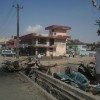Notes from Afghanistan: Part II, A Dismal Afghanistan Independence Day
August 19th marked the Afghan independence. On this day in 1919, Amanullah Shah, King of Afghanistan signed the treaty of Rawalpindi, ending his country’s dependence of foreign (read British) support, and re-cementing the disputed Durrand Line as the border between Afghanistan and India. Since that time, two features have remained constant in Afghan politics. First, despite numerous attempts at creating a modern state, Afghanistan remains just as dependent on foreign nations as it was in 1919—then it was England and Russia, today: the U.S. and European allies. Second is the distrust between Afghans and Pakistanis. Despite the treaty of Rawalpindi, Afghanistan still disputes its eastern border, and many Afghans continue to blame Pakistan for the continued conflict.
Far from being the dawn of a strong independent state, Afghan independence ushered in a period of continued dependence, foreign intervention, and fractured and ineffective politics. Still the Afghans continue to celebrate this holiday, so it seemed almost inevitable that the Taliban would attempt to take advantage of this holiday to make a statement. All Americans registered with the State Department were put on high alert. Then, at 5:30 in the morning, on August 19th, a group of suicide bombers attacked the British Council. According to Taliban statements, the British target was chosen specifically to commemorate the holiday. Of course, many Kabulis would argue that if the Taliban were really keen on commemorating Afghan independence, they should reject Pakistani support, which has been a hallmark of the Taliban since its inception.
We awoke, not to explosions at the British Council, but to the State Department advisory warning us to stay inside. What’s an intrepid investigator to do? We briefly considered heading down to the site of the attack—a mere kilometer away—but we both rejected this idea. Why put our life at risk over an event that by this point was several hours old. What would there be to see anyway? There was also an unspoken recognition that the day was far from over, and there remained an increased chance that there would attacks in other parts of the city.
To be extra safe, we resolved to change hotels. We had been staying at an inexpensive hotel in central Kabul for over a week. Despite attempts to “keep a low profile”, most of neighborhood knew us, if not by name, than certainly by sight. On the way out, I talked to the hotel worker manning the hotel desk. He expressed disgust at the attack, particularly at the Afghan governments inability to do anything to resolve the security situation. Despite the claims of progress in terms of training Afghan National Security Forces, the hotel worker is hardly alone in his opinion. The perception among most Kabulis is that the police and army are incapable of defending Kabul on their own.
The truth is the events of the last 12 hours completely belie the notion of Afghan independence. A government, which has lost the support of its people and relies on U.S. backing, just fought off an attack from a Pakistan-backed insurgency. With such dismal news, it is easy to get discouraged, but many (in fact most) Kabulis we have talked to remain optimistic that a modern independent state can be created in Afghanistan. When that happens, I will celebrate Afghan Independence Day.
Edward Kenney
AfghanistanStudy Group Blogger


